| Written by: | Apple Languages |
| Date posted: | June 14, 2020 |
| Posted in: | Home / Information / Language fun / |
Which French do you speak?
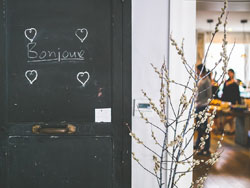 French is such a diverse language and its speakers can prove to be extremely creative. Did you know, for instance, that different French speakers use different words to count, that some of them grow up using French words that have a different meaning to that in Standard French, or that they use different idioms depending on where they come from? Well, if you’re interested to know more about the French spoken outside of France, I gladly invite you to read further.
French is such a diverse language and its speakers can prove to be extremely creative. Did you know, for instance, that different French speakers use different words to count, that some of them grow up using French words that have a different meaning to that in Standard French, or that they use different idioms depending on where they come from? Well, if you’re interested to know more about the French spoken outside of France, I gladly invite you to read further.
My name is Benoît and I am a translation student from Belgium. I have loved languages since my early childhood and I have always found it great to speak several languages. I want to share my passion for languages with you by talking about my mother tongue: French. By reading this post, not only will you see how varied the French language is, but also why French speakers are attached to the linguistic particularities of their region, and therefore why their language is closely linked to their identity.
Although some of the below examples are not always exclusive to one particular area, almost of all of them share the common trait of being either non-existent or very rare in Standard French. This means that these idiosyncratic forms are not taught in standard language classes. I hope I can give you an insight of the diversity of my language, and perhaps even the desire to learn more about other regions within the francosphere. Without further ado, let’s get into it and enjoy!
French in Africa

Today, Africa is home to the largest number of French speakers in the world – in fact, about half of all francophones, or French speakers, live on the other side of the Mediterranean Sea. As you will see from the following words and phrases, African French distinguishes itself by its inventiveness.
Être caillou (‘to be a stone/pebble’)
This figurative idiom is used in West African countries like the Ivory Coast or Burkina Faso. It is used to describe a difficult situation.
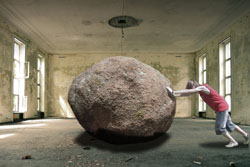
Être lourd (‘to be heavy’)
Être lourd literally means, ‘to be heavy’. However, this phrase can have a different meaning in Cameroon. If a person from this country describes someone as ‘heavy’, they probably want to tell you that this person is rich. Interestingly, in European francophone countries, one could use that phrase to describe someone who is annoying. In this case, they are ‘heavy’ because they are either saying or doing something which is getting on one’s nerves. This can create a misunderstanding if you are not aware of the difference in use!
Saper (‘to bring down, to undermine’)
The meaning of this verb in Standard French has the same meaning as in English; that is: to weaken someone’s physical power or to dishearten them. However, in the Congo, people started using this word to qualify someone who is well-groomed, stylish, and refined. This was reflective of a new cultural movement, wherein people began to associate success in life with success in style. In order to discuss this new fashion, which venerates haute couture and major brands, a new word was created: sapologie, which is basically the art of dressing elegantly. Today, this new meaning of the verb saper is so popular that its use has extended to all francophone countries in Africa, as well as Europe!
 Toubib (‘slang for doctor’)
Toubib (‘slang for doctor’)
This one comes from the Arabic word ṭabīb which means ‘doctor’, toubib being the North African variant. This term entered the mainland French vocabulary thanks to populations coming to Europe from the Maghreb, and is now widely used by francophones.
Mal (‘bad/badly’)
In many West African countries, mal can be synonymous with ‘very’ and used in both negative and positive contexts. Therefore, if a person from West Africa tells you that you are ‘bad/badly nice’, don’t be offended: it’s a compliment!
French in North America

French has played an important role in the recent history of North America, since French people were among the first Europeans to establish colonies in the territories which today belong to Canada and the United States. This legacy is still reflected today in the presence of diverse varieties of American French, like Acadian French and Louisiana French, and by the fact that many places in North America bear names of French origin (Newfoundland, Quebec, Vermont, Maine, Illinois, Detroit, St. Louis, Baton Rouge, New Orleans, etc.). I will, however, focus on idioms and words from Canadian French, since it is the most spoken variety of French in America.
Écœurant (sickening)
While French speakers use this word to refer to something that is unacceptable, or to describe terrible food, French Canadians actually use it to express their admiration or delight! If you eat at the restaurant with a person from Quebec and they enthusiastically say that the food is ‘sickening’, that means that they enjoy it.
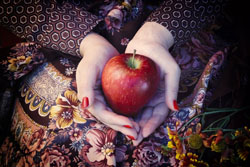 Chanter la pomme à quelqu’un (‘to sing someone the apple’)
Chanter la pomme à quelqu’un (‘to sing someone the apple’)
If, for example, a French Canadian tells you that her best friend ‘sang her the apple’, it means that the friend in question acted in a romantic way towards her. This is a very typical phrase from Quebec that other francophones will probably not understand. The origin of the expression may be Biblical; ‘singing the apple’ would thus evoke the forbidden fruit from the Garden of Eden. A second theory refers to Quebec folklore, which is often associated with traditional music and dance-oriented festivals. Depending on the dance that was practiced, there were a dozen different ways of holding hands between partners, each with different meanings. One of the practices consisted of touching the palm of one’s partner’s hand in a sensual way. This practice allowed both dance partners to express their desires for each other. Over time, the word paume (‘palm’) in the phrase would turn into pomme (‘apple’), to give the expression ‘singing the apple’.
Avoir les mains pleines de pouces (‘to have hands full of thumbs’)
The idiom ‘to have hands full of thumbs’ has the same meaning as, and may have been influenced by, the English expression ‘to be all thumbs’, since interactions between French and English are constant in Canada. The Standard French equivalent would be avoir deux mains gauches (‘to have two left hands’). By the way, the adjective gauche does not only mean ‘left’; it can also be used to describe someone who is awkward.
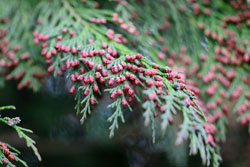 Passer un sapin/se faire passer un sapin (‘to give a fir tree/to be given a fir tree’)
Passer un sapin/se faire passer un sapin (‘to give a fir tree/to be given a fir tree’)
This phrase is found in many diverse regions of the francosphere, but it’s mostly used in Quebec. It owes its existence to the balsam fir, whose wood has a very low market value because it does not stand the test of time, so it ends up drying and cracking. Therefore, someone may use this expression when they feel they were scammed.
Crisse, câlisse, tabarnak ! (‘Oh, my God!’)
French-speaking Canadian people use these mildly minced oaths – and dozens of others which are considered ruder – to express their stupefaction. These three words are actually derivatives of ‘Christ’, ‘chalice’, and ‘tabernacle’, whose pronunciation was slightly altered to avoid blasphemy. Every speaker has their own way of being flabbergasted, but these interjections are very typical of Canada, and frequently used in the French-speaking communities there.
French in Switzerland

Swiss French is the variety that is spoken in the French-speaking area of Switzerland by around 2 million people. Although it is very close to Standard French, some words and phrases are different. As you will see, francophones in Switzerland also tend to ascribe a different meaning to regular French words.
Numbers
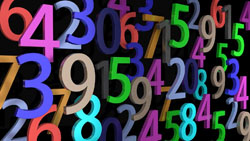 As I mentioned earlier, the words francophones use to refer to numbers are a bit different, more specifically regarding the tens. In Standard French, 70, 80, and 90 are soixante-dix, quatre-vingt, and quatre-vingt-dix respectively – literally ‘sixty-ten’, ‘four-twenty’, and ‘four-twenty-ten’. Indeed, while all languages in the world use the decimal system, French seems to disrupt this logic with the three last tens before 100. Why say ‘sixty plus ten’ instead of ‘seventy’? And why is French the only language to do this? To understand the reason, we need to go back in history …
As I mentioned earlier, the words francophones use to refer to numbers are a bit different, more specifically regarding the tens. In Standard French, 70, 80, and 90 are soixante-dix, quatre-vingt, and quatre-vingt-dix respectively – literally ‘sixty-ten’, ‘four-twenty’, and ‘four-twenty-ten’. Indeed, while all languages in the world use the decimal system, French seems to disrupt this logic with the three last tens before 100. Why say ‘sixty plus ten’ instead of ‘seventy’? And why is French the only language to do this? To understand the reason, we need to go back in history …
Before the arrival of Romans, the territory of modern-day France was inhabited by Celtic tribes who were using a vicesimal numeral system to count. To simplify, instead of using a base 10 system like the Romans, these tribes were using a base 20 system. Once their territory was conquered by the Roman Empire, the Celts would start using a hybrid system. This means that they would say 30, 40, 50, and 60 like so: ‘twenty-ten’, ‘two-twenty’, ‘two-twenty-ten’, ‘three-twenty’, and so on. Over the centuries, people progressively abandoned this way of counting, but remnants of this ancient system are still found in contemporary French, and these are considered the norm by the Académie française.
Today, most French speakers and learners around the world use soixante-dix, quatre-vingt, and quatre-vingt-dix. However, there are some exceptions to this rule, since a lot of francophones in Switzerland use septante, huitante, and nonante.
Note: Almost all people in Belgium, as well as some people in Southern France and Central Africa, also use septante and nonante, but not huitante: they say quatre-vingt like the French. And you thought counting was simple …

Poutzer (‘to clean’)
This word directly derives from the German putzen, which means ‘to clean’. Due to their proximity to Germany and German-speaking Switzerland, French-speaking Swiss people have borrowed lots of words from German.
Natel (‘mobile phone’)
Natel is simply a Swiss French word for ‘mobile phone’, though its meaning isn’t immediately obvious.
 Adieu (‘farewell’)
Adieu (‘farewell’)
When a French person says adieu, it generally means that they are leaving and that you will probably never see them again. However, French speakers of Switzerland say adieu to greet people when they meet or leave each other in an informal context. In other words, it can either mean ‘hi’ or ‘bye’, much like the Italian ciao. If your Swiss friend tells you adieu, don’t worry: you will see them again.
Avoir meilleur temps (‘to have better time’)
When a Swiss person tells you that ‘you should have better time to do something’, they mean that you should do something. This idiom would probably confuse other French speakers at first, since they would say something like tu devrais faire ceci (‘you should do this’).
French in Belgium

Finally, let’s talk about the type of French I know best: Belgian French. Just like Swiss French, the French spoken in Belgium differs very little from Standard French, though it has its own distinctive colour. Here are a few examples:
 Déjeuner, dîner, souper (respectively: ‘breakfast’, ‘lunch’, ‘dinner’)
Déjeuner, dîner, souper (respectively: ‘breakfast’, ‘lunch’, ‘dinner’)
In France, you take your petit déjeuner in the morning, your déjeuner at midday, and your diner in the evening. However, in Belgium it’s a bit different: the déjeuner is taken in the morning, the dîner is lunch, and the souper is the last meal of the day. I should also point out that francophones from Switzerland and Canada tend to name meals in this way.
Kot (‘box room’)
Kot is a funny and short word that Belgians use for ‘student room’. This word originally comes from Middle Dutch cote, which means ‘tiny house’. It is used in Dutch-speaking as well as French-speaking Belgium, and perfectly illustrates the fact that Belgian French has borrowed some words from Dutch. If you are planning to study in Belgium and seeking a student room, be sure to look for a kot when reading the classified ads.
 Dracher (‘to pour down’)
Dracher (‘to pour down’)
French is very creative when it comes to describing heavy rain – see pleuvoir à verse, pleuvoir des cordes, pleuvoir des trombes, pleuvoir à torrents, pleuvoir à seaux, etc. I am probably forgetting some idioms and I am sure almost every region in the French-speaking world has its own expression to refer to torrential rainfall. In Belgium and the northernmost regions of France, we simply say dracher. Sometimes French can be simple, too.
Avoir bon (‘to have good’)
When Belgian people say they are ‘having good’, it means that they are feeling very cosy or enjoying a moment or activity very much. Other francophones will probably guess what the Belgian means, but would not naturally say that; they would say être bien (‘to be good’) or se sentir bien (‘to feel good’).
Être bleu de quelqu’un (‘to be blue of someone’)
In Belgium, when you are ‘blue of someone’, it means that you are passionately in love with them. Indeed, if French speakers or learners are not aware of this phrase, they will very likely not understand it. Standard French speakers would more likely say être fou amoureux (‘to madly love’) or être raide dingue de quelqu’un (‘to be crazy about someone’).

French is Fun
We could go on almost forever, because there are so many distinctive and unique words and idioms which all reflect the many facets of French and its rich history. I do not know all the characteristics of the French spoken even in my own tiny country, but I am sure of one thing: no matter which French-speaking country you visit, you will be able to communicate with all French-speakers around the world. After all, in the end, we all speak francophonie.
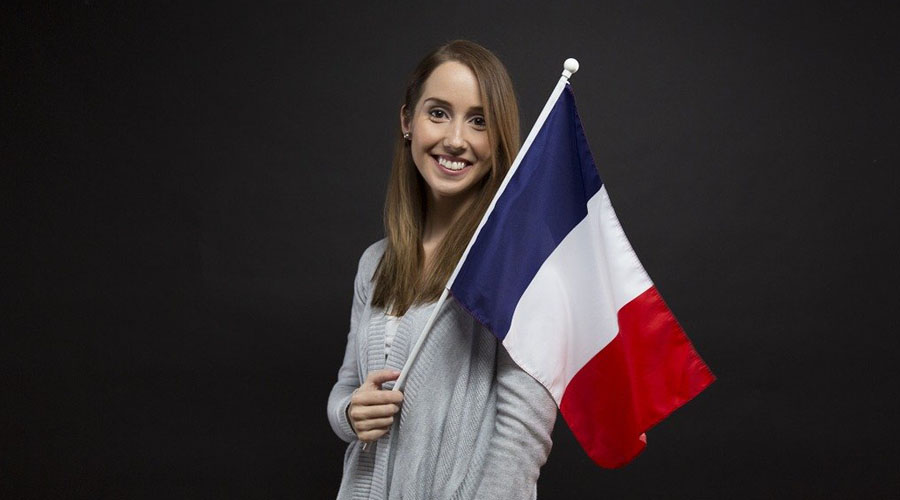
Has Benoit’s blog piqued your interest? Check out our French schools and feel free to contact us if you have any questions about any of our courses or locations, or need help arranging our own exciting immersive experience!
Blog Categories
- Activities (4)
- Yoga (1)
- Christmas Courses (17)
- Food (21)
- Recipes (4)
- Information (83)
- Instagram (11)
- Language fun (11)
- My travel journal (15)
- Sample Programmes (2)
- Video Guides (11)
- Locations (430)
- America (4)
- Argentina (15)
- Bariloche (4)
- Buenos Aires (8)
- Cordoba (2)
- Mendoza (1)
- Australia (1)
- Sydney (1)
- Austria (4)
- Brazil (5)
- Maceio (2)
- Salvador da Bahia (2)
- Sao Paulo (1)
- Canada (8)
- Chile (4)
- China (7)
- Colombia (2)
- Costa Rica (8)
- Flamingo Beach (5)
- Monteverde (1)
- Cuba (8)
- Havana (3)
- Santiago de Cuba (3)
- Trinidad (2)
- Czech Republic (2)
- Prague (2)
- Dominican Republic (1)
- Santo Domingo (1)
- Ecuador (3)
- Egypt (2)
- Cairo (2)
- England (23)
- Bournemouth (1)
- Brighton (1)
- Bristol (1)
- Cambridge (2)
- Liverpool (9)
- London (3)
- Manchester (2)
- Oxford (1)
- Portsmouth (1)
- France (53)
- Germany (49)
- Greece (4)
- Guadeloupe (3)
- Guatemala (2)
- Antigua (2)
- Ireland (4)
- Italy (78)
- Japan (3)
- Latvia (1)
- Riga (1)
- Malta (3)
- Mexico (10)
- Cuernavaca (1)
- Guadalajara (1)
- Guanajuato (1)
- Mexico City (1)
- Playa del Carmen (6)
- Morocco (1)
- Rabat (1)
- Netherlands (4)
- Panama (1)
- Bocas del Toro (1)
- Boquete (1)
- Peru (5)
- Poland (2)
- Portugal (9)
- Russia (6)
- Moscow (2)
- St Petersburg (2)
- Scotland (2)
- Edinburgh (2)
- Spain (89)
- Alicante (1)
- Barcelona (13)
- Bilbao (1)
- Cadiz (1)
- Costa Adeje (1)
- El Puerto (3)
- Granada (5)
- Ibiza (1)
- Lanzarote (1)
- Madrid (6)
- Malaga (15)
- Marbella (1)
- Murcia (1)
- Nerja (4)
- Pamplona (1)
- Puerto de la Cruz (3)
- Salamanca (3)
- San Sebastian (7)
- Santiago de Compostela (2)
- Seville (5)
- Tenerife (6)
- Valencia (9)
- Vejer de la Frontera (2)
- Sweden (2)
- Stockholm (1)
- Switzerland (2)
- Montreux (1)
- Ukraine (2)
- Kiev (2)
- United Arab Emirates (1)
- Dubai (1)
- Uruguay (1)
- Montevideo (1)
- New Schools (14)










 Company Number: 08311373
Company Number: 08311373